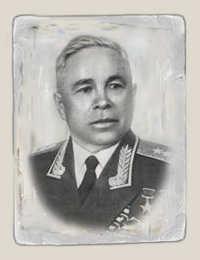Afanasy Beloborodov
 31.1.1903 - 1.9.1990 31.1.1903 - 1.9.1990Afanasy Beloborodov - Commander of the 43rd Army, Lieutenant-General. He was born on January 31, 1903 in Akinino village, today Irkutsk district of the Irkutsk region in a peasant family. Russian. A member of the CPSU (B) / Communist Party since 1926. He graduated 3 grades of the rural school. In 1919-1920 he was a partisan in the Far East in the 8th Irkutsk Regiment of the 1st Chita Infantry Division. Joined the Red Army again in 1923. In 1926, he graduated from Nizhny Novgorod Infantry School and served as commander of a rifle platoon. After graduating from military and political training in 1929, he was appointed political commissar of the rifle company. After the death of a commander in action during an armed conflict on the CER in 1929, he took over command of the company and successfully led it in subsequent battles. In 1936 he graduated from the Frunze Military Academy, and served as Assistant Chief, then Chief of Staff of the operational infantry division in the Far East. From March 1939 - Operations Chief of Staff of the 31st Rifle Corps; and from June - Chief of Staff of the 43rd Infantry Corps. From January to June 1941, he headed the department of military training of the Far Eastern Front. Since July 1941, Colonel A. Beloborodov – Commander of the 78th Infantry Division, he arrived with at the Western Front in October 1941. For heroism, high combat qualities and skillful actions in the Battle of Moscow, in November 1941, the division was transformed into the 9th Guards, and its commander was awarded the rank of Major-General. In spring and summer of 1942, the 9th Guards Rifle Division, commanded by Beloborodov successfully conducted combat operations in the South-Western Front at the Seversky Donets. In October 1942, A. Beloborodov commanded the 5th Guards Rifle Corps, participated in breaking the enemy’s defense in Velikie Luki operation of the Kalinin Front. Since August 1943, he was commander of the 2nd Guards Rifle Corps, which troops held successful combat operations near the city of Smolensk, at Dukhovshchina-Town (released on September 19, 1943) and further north of Vitebsk in Belarus (early 1944). On May 22, 1944, Lieutenant General A. Beloborodov - Commander of the 43rd Army. The Army troops in the 1st Baltic Front during the Vitebsk-Orsha operation broke through the enemy defense in depth, crossed the Western Dvina river, and together with the adjacent 39th Army of the 3rd Belorussian Front, surrounded and destroyed the Vitebsk group of the fascist troops of the 5th division. By the Decree of the Presidium of the Supreme Soviet dated July 22, 1944 for combat service and skillful command of the troops in the Vitebsk operation, Lieutenant General Afanasy Beloborodov was awarded the title of Hero of the Soviet Union, the Order of Lenin and the Gold Star medal (№ 4157). In 1944, the commander Beloborodov successfully led the troops of the 43rd Army in Polotsk, Siauliai, Riga and Memel operations; and in 1945, when the army was part of the 3rd Belorussian Front - in Insterburg-Koenigsberg, Koenigsberg and Samland operations. During these operations, he took bold and reasonable decisions, exercised sensible initiative. By the Decree of the Presidium of the Supreme Soviet on April 19, 1945 for heroism and courage in the storming of Koenigsberg, Lieutenant General Afanasy Beloborodov was awarded the second Gold Star medal (№ 5542). In August-September 1945, Colonel General A. Beloborodov commanded the 1st Red Banner Army of the 1st Far Eastern Front, which participated in the defeat of the Japanese Kwantung Army. After the Great Patriotic War, A. Beloborodov was Commander of the Army in 1946-1953, then headed the infantry combat training of troops, headed “The Shot” courses, was Deputy Chief of the Central Group of Forces. From 1955 - Commander of the Voronezh Military District, from 1957 - Head of Staff of the Ministry of Defense. In 1963, A. Beloborodov was assigned the military rank of General of the Army. The same year he was appointed Commander of the Moscow Military District. Since 1968 he was in the Group of Inspectors General of the Ministry of Defence. A member of the CPSU Central Committee in 1966-1971. A member of the Supreme Soviet of the USSR of the 3rd and the 7th convocations. Died on September 1, 1990. He was buried at the military memorial cemetery “Snegiri” (the Moscow region, Istra district). He was awarded five Orders of Lenin, the Order of the October Revolution, five Orders of the Red Banner, the Orders of Suvorov of the 1st and 2nd degrees, the 2nd class Order of Kutuzov, the 1st Class Order of the Great Patriotic War, the 3rd Class Order “For the Service to the Motherland in the Armed Forces”; medals, and foreign orders and medals. A bust was installed in Irkutsk. |




